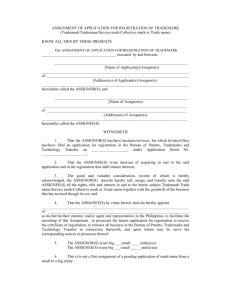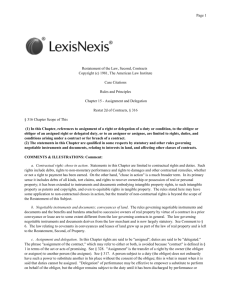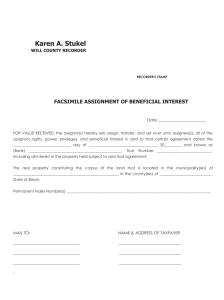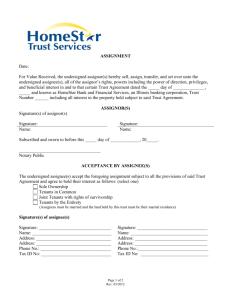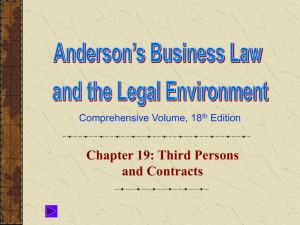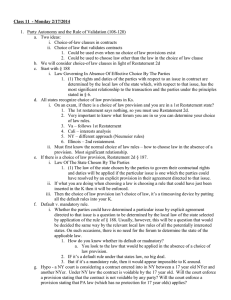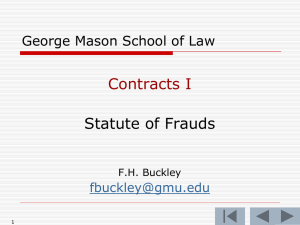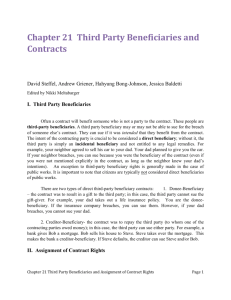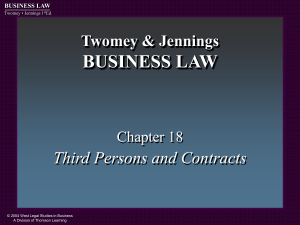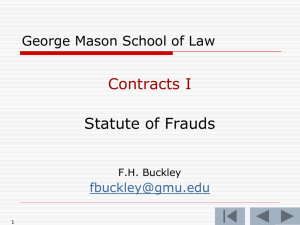Contract Law: Assignment & Delegation - Restatement §324
advertisement
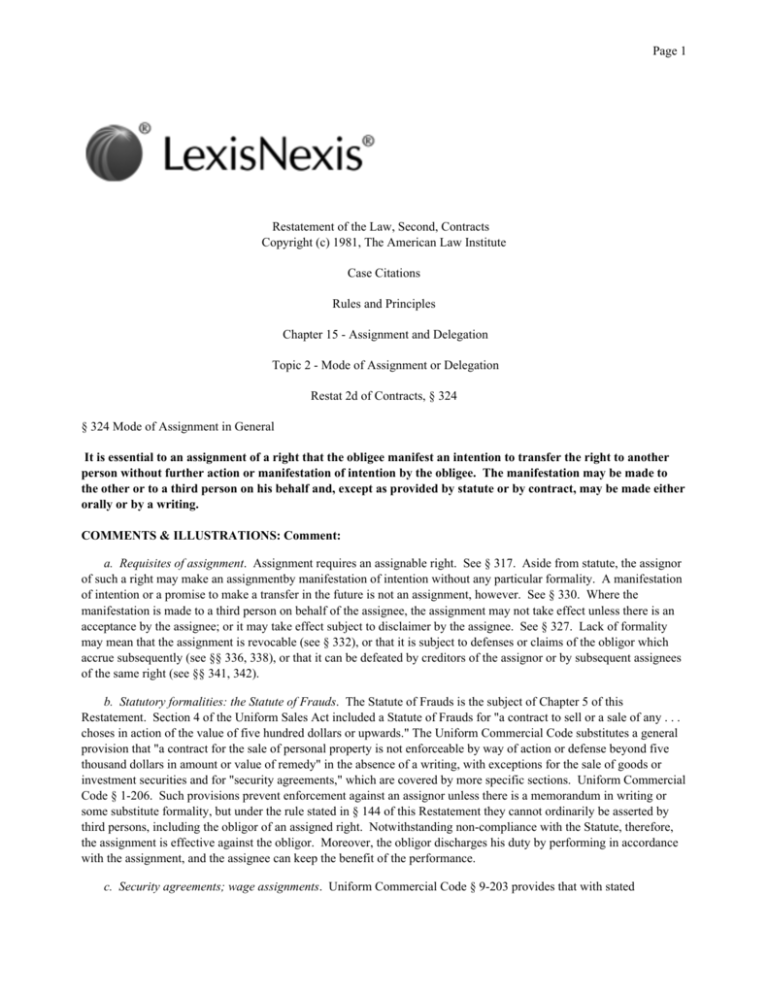
Page 1 Restatement of the Law, Second, Contracts Copyright (c) 1981, The American Law Institute Case Citations Rules and Principles Chapter 15 - Assignment and Delegation Topic 2 - Mode of Assignment or Delegation Restat 2d of Contracts, § 324 § 324 Mode of Assignment in General It is essential to an assignment of a right that the obligee manifest an intention to transfer the right to another person without further action or manifestation of intention by the obligee. The manifestation may be made to the other or to a third person on his behalf and, except as provided by statute or by contract, may be made either orally or by a writing. COMMENTS & ILLUSTRATIONS: Comment: a. Requisites of assignment. Assignment requires an assignable right. See § 317. Aside from statute, the assignor of such a right may make an assignmentby manifestation of intention without any particular formality. A manifestation of intention or a promise to make a transfer in the future is not an assignment, however. See § 330. Where the manifestation is made to a third person on behalf of the assignee, the assignment may not take effect unless there is an acceptance by the assignee; or it may take effect subject to disclaimer by the assignee. See § 327. Lack of formality may mean that the assignment is revocable (see § 332), or that it is subject to defenses or claims of the obligor which accrue subsequently (see §§ 336, 338), or that it can be defeated by creditors of the assignor or by subsequent assignees of the same right (see §§ 341, 342). b. Statutory formalities: the Statute of Frauds. The Statute of Frauds is the subject of Chapter 5 of this Restatement. Section 4 of the Uniform Sales Act included a Statute of Frauds for "a contract to sell or a sale of any . . . choses in action of the value of five hundred dollars or upwards." The Uniform Commercial Code substitutes a general provision that "a contract for the sale of personal property is not enforceable by way of action or defense beyond five thousand dollars in amount or value of remedy" in the absence of a writing, with exceptions for the sale of goods or investment securities and for "security agreements," which are covered by more specific sections. Uniform Commercial Code § 1-206. Such provisions prevent enforcement against an assignor unless there is a memorandum in writing or some substitute formality, but under the rule stated in § 144 of this Restatement they cannot ordinarily be asserted by third persons, including the obligor of an assigned right. Notwithstanding non-compliance with the Statute, therefore, the assignment is effective against the obligor. Moreover, the obligor discharges his duty by performing in accordance with the assignment, and the assignee can keep the benefit of the performance. c. Security agreements; wage assignments. Uniform Commercial Code § 9-203 provides that with stated Page 2 Restatement of the Law, Second, Contracts, § 324 exceptions "a security interest is not enforceable against the debtor or third parties" unless the collateral is in the possession of the secured party or the debtor has signed a security agreement. This provision applies not only where the "debtor" assigns contractual rights as security for an obligation, but also where the "debtor" is a "seller of accounts or chattel paper." §§ 1-201(37), 9-102(1)(b), 9-105(1)(d); see the Statutory Note at the beginning of this Chapter and the Reporter's Note to § 317. Transactions subject to this provision are not enforceable against anyone unless the statutory formalities are met. Statutes regulating assignments of wages may go further and deny all effect to a non-complying assignment. REPORTERS NOTES: This Section is based on former §§ 149(1) and 157. See 3 Williston, Contracts §§ 404, 430 (3d ed. 1960); 4 Corbin, Contracts §§ 861, 879 (1951). Comment a. See Monegan v. Pacific Nat'l Bank, 16 Wash. App. 280, 556 P.2d 226 (1976); Twin Valley Motors v. Morale, 136 Vt. 115, 385 A.2d 678 (1978); Certified Collectors v. Lesnick, 116 Ariz. 601, 570 P.2d 769 (1977). Courts often speak of the requirement that the purported assignor completely divest himself of control. See, e.g., Monegan v. Pacific Nat'l Bank, supra; Miller v. Wells Fargo Int'l Bank, 540 F.2d 548 (2d Cir. 1976); S.L. Nusbaum & Co. v. Atlantic Virginia Realty Corp., 206 Va. 673, 146 S.E.2d 205 (1966). CROSS REFERENCES: ALR Annotations: Sale of contractual rights; defect in written record as ground for avoiding sale. 10 A.L.R.2d 728. Digest System Key Numbers: Assignments 31 et seq.
